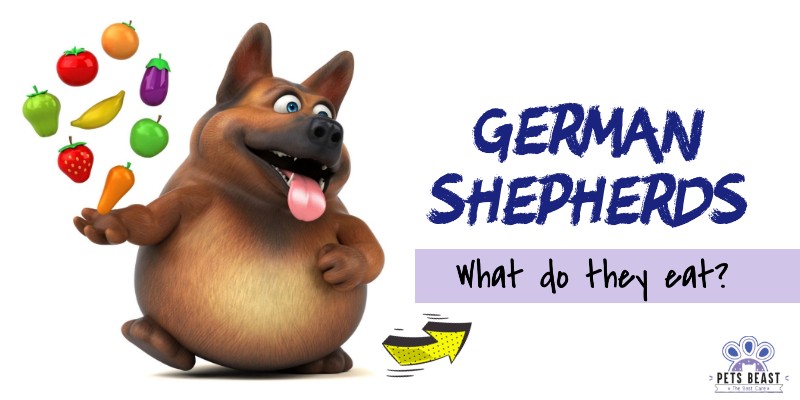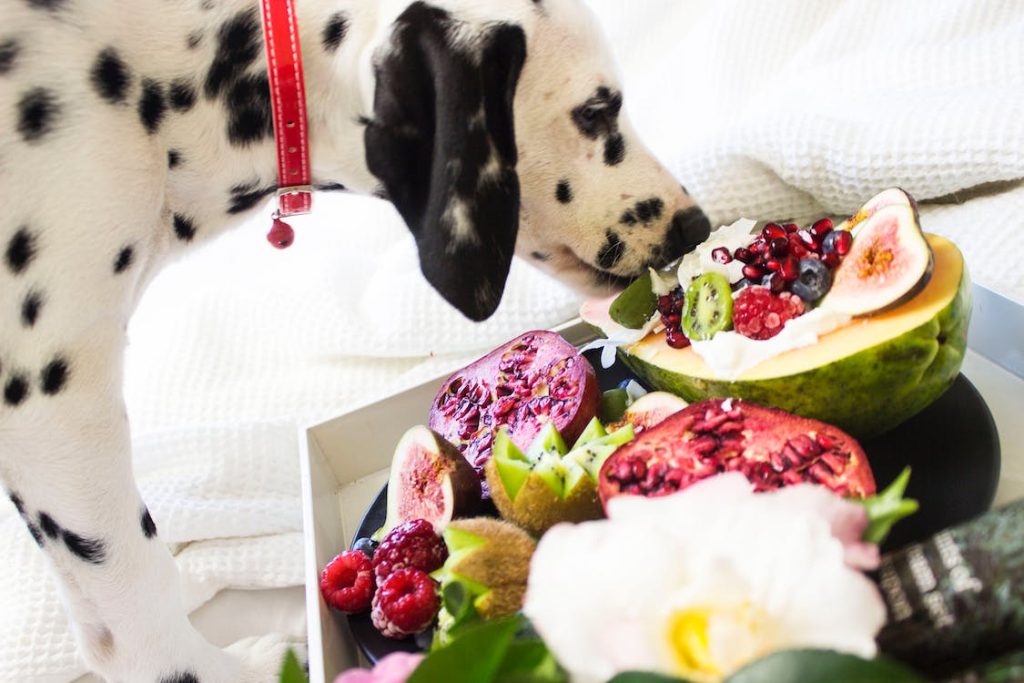A Good Dog Food is the best source of complete nutrition to properly raise the German Shepherd. The GSD likes to eat some human foods too, but all of the human foods are not suitable for the dogs. For example, raw meat can be given to a dog but never feed a dog with cooked meat.
To maintain the strength of the body and achieve the aims and goals, a German Shepherd requires plenty of food. But make sure that the food that you give to your dog won’t make it fat and lazy. Running, jumping, fetching are the hobbies of a German Shepherd that keep it active. A fat and lazy dog will not be able to jump or run and will become useless and inefficient.
German Shepherds are the dogs that look huge but they belong to a middle breed. They have a strong and muscular body as their breed was initiated to train them as service dogs. They have been working as a herding dog, police dog, guard, etc. since the late 19th century.

Food liked by German Shepherds
The food that is particularly eaten and liked by the German Shepherds is dog food. Apart from the dog food, there are few more human foods that the German Shepherds like to eat. These foods contain some fruits, vegetables, and meat, etc. Check out the list of Best food for German Shepherds.
Getting more specific, the following food items are liked by the German Shepherds and these food items are suitable for the sensitive stomach of a German Shepherd as well.
- Peanut butter
- Apples
- Hot dogs
- Raw chicken
- Watermelon
- Pizza crust
- Yogurt
- Beef
- Pork
- Cooked eggs
- Carrots
- Rice
- Sweet potato
Which Food is not suitable for a German Shepherd?
There are many food items that a German Shepherd loves and would never refuse to eat. But those food items do not suit the stomach of a dog and can cause severe illness. The food items that you must never offer to your German Shepherd are:
- Spicy food
- Sweets
- Chocolates
- Raisins
- Garlic
- Grapes
- Cheese
- Cooked chicken
All of these food items are fatal for a German Shepherd and can result in severe illness. You should avoid feeding your German Shepherd with such foods. Keeping a German Shepherd as a pet is fun but it needs a responsible behavior to care for a dog properly. A big part of the process of taking care involves understanding the nutritional needs of a dog.
[box type=”shadow” align=”” class=”” width=””]Other Related Articles:
[tie_list type=”lightbulb”]- German Shepherd Breed: Traits & Personality
- Life Span of German Shepherd Dogs
- Best German Shepherd Dog Foods
- German Shepherd Weight
- Why Does The Ears of German Shepherd Stand Up?
- How Much Does a German Shepherd Cost?
- Why Do German Shepherds Jump?
- Are German Shepherds Good Service Dogs?
Nutritional Needs of a German Shepherd
German Shepherd is a strong and tall dog of 24 to 26-inches. An adult German Shepherd weighs about 70 to 90 pounds and most of its weight comes from its strong bones and muscles. These strong bones and muscles make a German Shepherd active and athletic.
For the strong muscles and bones, German Shepherds need proper food that fulfills their nutritional requirements. Some basic nutritional needs of a German Shepherd are;
- 3 to 5 cups of dog food that make 1 pound are enough for a day.
- German Shepherds have abundant energy. To maintain this energy, they need a good amount of proteins. Proteins also help to strengthen and develop their muscles and supply additional fats for energy.
- The growing German Shepherds need 22% proteins, while the adult dogs need 18% proteins daily.
- The main sources of protein are whole meat, like uncooked beef, fish, and chicken.
- The amount of fats required for growing puppies is 8% while for adult German Shepherd, the amount of fats required for energy is 5%.
- The need of fats can be fulfilled by foods containing fish oil and vegetables. These are full of omega 3 fatty acids.
- The active and adult German Shepherds require 1700 to 2100 calories in one day. The inactive and senior German Shepherds require 1200 to 1500 calories per day.
- Digestible carbohydrates are also necessary to be a part of a German Shepherd’s diet.
- Small amounts of barley, oats, and rice are rich sources of carbohydrates that can be easily digested.
Problems caused by improper food intake
If you have an active German Shepherd at your home then nothing will depress you more than your dog getting ill. Most of the diseases caused to German Shepherd are related to its stomach. These stomach problems are caused by feeding your dog with unhealthy or inappropriate food.
The stomach of a German Shepherd is very sensitive and it easily gets troubled if the food intake is unhealthy or improper.
Let us have a look at the health problems a German Shepherd can go through due to false feeding.
- Obesity
German Shepherds are tall and healthy but they are not fat. They need an active and slim body to do their job requiring running, jumping, and detecting. Overfeeding and lack of regular exercise can make your dog obese.
Your dog is getting overweight or obese if you can not feel its ribs while gently pressing the coat. This is an alarming situation and you need to consult the vet immediately.
Overweight is dangerous for a German Shepherd’s health. It can become a reason for diseases like arthritis, hip dysplasia, and elbow dysplasia (How long GSD Live). The excess weight lays pressure on the joints and can make your dog paralyzed.
To avoid obesity, you need to make some changes to the diet of your dog. Add some fresh fruits and vegetables in their diet. It will help in maintaining a healthy weight of your dog without letting it feel hunger.
You can provide your dog with dog toys and treats. This will keep the dog engaged and will not increase its weight and make it obese.
- Bloat
One of the common diseases of German Shepherd is Gastric Dilatation Volvulus, also known as bloat. In this disease, the stomach gets filled with gas and swells up like a balloon. This is a dangerous disease that can lead to death if the dog is not taken to a vet instantly.
The main factor behind this disease can be the gulping of food and energetic exercise within an hour. Bloating can cause the cutting off the circulation to the stomach and other major body organs.
The signs of bloat are; an attempt of vomiting, expanded stomach, getting lethargic, and faint.
Bloating can be controlled by dividing the food of your dogs into smaller portions of meals throughout the day. There should be at least 2 meals a day. Do not let your dog eat and drink the whole day. Make a routine and make your dog stick to it. These short meals will help in easy digestion and will prevent bloating.
- Weight loss
You might notice someday that your dog is eating normally but its weight is reducing rapidly. This weight loss can be caused by a disease called exocrine pancreatic insufficiency or due to small intestine problems.
If you notice weight loss, consult your vet instantly. The vet will ask you to make some changes to the diet. In the treatment of these diseases, high-quality proteins and digestible carbohydrates will help the best. For rich protein, you can add chicken or lamb and for carbohydrates, rice and potato will be reasonable food items.
Final Words
German Shepherd is a human-friendly, loyal, and active dog. If you have decided to keep it as a pet in your home, then make sure that you fulfill all of its requirements, especially the nutritional needs. If your dog will intake healthy food, it will remain active, it will be loyal to you and will easily get attached to you.








